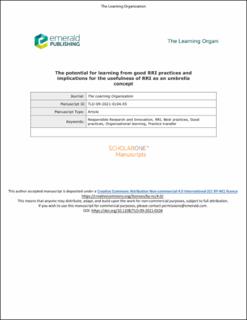| dc.contributor.author | Forsberg, Ellen-Marie | |
| dc.contributor.author | Wittrock, Christian | |
| dc.date.accessioned | 2023-04-26T11:42:25Z | |
| dc.date.available | 2023-04-26T11:42:25Z | |
| dc.date.created | 2022-12-01T08:32:50Z | |
| dc.date.issued | 2022 | |
| dc.identifier.citation | Learning Organization. 2022, . | en_US |
| dc.identifier.issn | 0969-6474 | |
| dc.identifier.uri | https://hdl.handle.net/11250/3065131 | |
| dc.description.abstract | Purpose: The purpose of this contribution is to analyze reported good institutional Responsible Research and Innovation (RRI) practices from an organizational and learning perspective in order to discuss the usefulness of RRI as a broad umbrella concept.
Design/methodology/approach: We connect neo-institutional and translation accounts of diffusion to different modes of learning, and discuss reported best practices from 12 reports, including in total 23 organizations in the research system world-wide, in light of this theoretical framework. We categorize the good practices identified in the reports and discuss how the nature of the practices influences the potential learning from them. We then apply the results from our discussion to current policy developments on RRI.
Findings: The two most often mentioned good practices overall are organizational policies and the establishment of organizational units, but the type of good practices recommended differs across the various aspects of the RRI umbrella concept. This diversity within the RRI construct is a practical argument against the effectiveness of RRI as an umbrella concept.
Originality: Our study is novel in the fact that we, building on Wæraas (2020), systematically relate types of good practice to neo-institutional theory and translation perspectives explicitly combined with learning approaches and apply this approach in the field of research organizations. The policy implications from the empirical and theoretical analyses are novel and timely in these early phases of the EU funding framework programme Horizon Europe and can also be relevant for the increasingly important umbrella concept of Open Science. | en_US |
| dc.language.iso | eng | en_US |
| dc.publisher | Emerald | en_US |
| dc.relation.ispartofseries | Learning Organization; | |
| dc.relation.uri | https://www.emerald.com/insight/content/doi/10.1108/TLO-09-2021-0104/full/html | |
| dc.rights | Navngivelse-Ikkekommersiell 4.0 Internasjonal | * |
| dc.rights.uri | http://creativecommons.org/licenses/by-nc/4.0/deed.no | * |
| dc.subject | Organsiasjonslæring | en_US |
| dc.subject | Organizational learning | en_US |
| dc.subject | Best practice | en_US |
| dc.subject | Best practice | en_US |
| dc.subject | Paraplybegrepper | en_US |
| dc.subject | Umbrella Concepts | en_US |
| dc.title | The potential for learning from good RRI practices and implications for the usefulness of RRI as an umbrella concept | en_US |
| dc.type | Peer reviewed | en_US |
| dc.type | Journal article | en_US |
| dc.description.version | acceptedVersion | en_US |
| cristin.ispublished | true | |
| cristin.fulltext | original | |
| cristin.fulltext | postprint | |
| cristin.qualitycode | 1 | |
| dc.identifier.doi | http://dx.doi.org/10.1108/TLO-09-2021-0104 | |
| dc.identifier.cristin | 2086592 | |
| dc.source.journal | Learning Organization | en_US |
| dc.source.pagenumber | 33 | en_US |
| dc.relation.project | EC/H2020/Science-with-and-for-Society programme (grant no. 709 637) | en_US |
| dc.subject.nsi | VDP::Statsvitenskap og organisasjonsteori: 240 | en_US |
| dc.subject.nsi | VDP::Political science and organisational theory: 240 | en_US |
| dc.subject.nsi | VDP::Statsvitenskap og organisasjonsteori: 240 | en_US |
| dc.subject.nsi | VDP::Political science and organisational theory: 240 | en_US |

